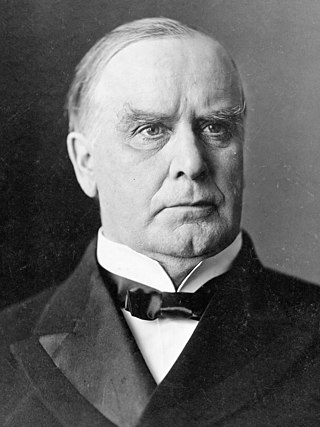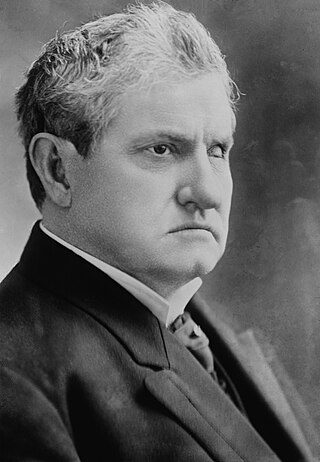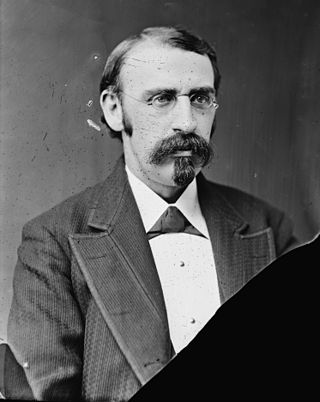Related Research Articles

The 1900 United States presidential election was the 29th quadrennial presidential election, held on Tuesday, November 6, 1900. In a re-match of the 1896 race, incumbent Republican President William McKinley defeated his Democratic challenger, William Jennings Bryan. McKinley's victory made him the first president to win a consecutive re-election since Ulysses S. Grant accomplished the same feat in 1872. Until 1956, this would be the last time in which an incumbent Republican president would win re-election after serving a full term in office. This election saw the fifth rematch in presidential history, something that would also not occur again until 1956. This was also the first rematch to produce the same winner both times.

The 1924 United States presidential election was the 35th quadrennial presidential election, held on Tuesday, November 4, 1924. In a three-way contest, incumbent Republican President Calvin Coolidge won election to a full term. Coolidge was the second vice president to ascend to the presidency and then win a full term.

Benjamin Ryan Tillman was a politician of the Democratic Party who served as governor of South Carolina from 1890 to 1894, and as a United States Senator from 1895 until his death in 1918. A white supremacist who opposed civil rights for black Americans, Tillman led a paramilitary group of Red Shirts during South Carolina's violent 1876 election. On the floor of the U.S. Senate, he defended lynching, and frequently ridiculed black Americans in his speeches, boasting of having helped kill them during that campaign.

Francis Wilkinson Pickens was an American politician who served as governor of South Carolina when that state became the first to secede from the United States. A cousin of Senator John C. Calhoun, he was born into the Southern planter class. A member of the Democratic Party, Pickens became an ardent supporter of nullification of federal tariffs when he served in the South Carolina House of Representatives before he was elected to the United States Senate.

William Jennings Bryan Dorn was a United States politician from South Carolina who represented the western part of the state in the United States House of Representatives from 1947 to 1949 and from 1951 to 1975 as a Democrat.

Edmund William McGregor Mackey was a lawyer, state representative, and United States Representative from South Carolina. He was a leader in the Republican Party.

The 1876 South Carolina gubernatorial election was held on November 7, 1876, to select the governor of the state of South Carolina. The election campaign was a referendum on the Radical Republican-led state government and their Reconstruction policies. Opponents disputed the challenger Wade Hampton III's victory, gained by a margin of little more than 1100 votes statewide. But he took office in April 1877, after President Hayes withdrew federal troops as a result of a national Democratic compromise, and the incumbent Daniel Henry Chamberlain left the state.

The 1968 United States House of Representatives elections in South Carolina were held on November 5, 1968, to select six Representatives for two-year terms from the state of South Carolina. The primary elections were held on June 11 and the runoff elections were held two weeks later on June 25. All five incumbents who ran were re-elected and the open seat in the 5th district was retained by the Democrats. The composition of the state delegation remained five Democrats and one Republican.

The 1992 United States House of Representatives elections in South Carolina were held on November 6, 1992, to elect the six U.S. representatives from the state of South Carolina, one from each of the state's six congressional districts. The elections coincided with the 1992 U.S. presidential election, as well as other elections to the House of Representatives, elections to the United States Senate and various state and local elections.

The 1954 United States House of Representatives elections in South Carolina were held on November 2, 1954 to select six Representatives for two-year terms from the state of South Carolina. The primary elections were held on July 13. All six incumbents were re-elected and the composition of the state delegation remained solely Democratic.

The 1956 United States House of Representatives elections in South Carolina were held on November 6, 1956, to select six Representatives for two-year terms from the state of South Carolina. All five incumbents who ran were re-elected and the open seat in the 5th congressional district was retained by the Democrats. The composition of the state delegation thus remained solely Democratic.

The 1962 United States House of Representatives elections in South Carolina were held on November 6, 1962 to select six Representatives for two-year terms from the state of South Carolina. The primary elections were held on June 12 and the runoff elections were held two weeks later on June 26. All five incumbents who ran were re-elected and the open seat in the 2nd congressional district was retained by the Democrats. The composition of the state delegation thus remained solely Democratic.

The 1966 United States House of Representatives elections in South Carolina were held on November 8, 1966 to select six Representatives for two-year terms from the state of South Carolina. All six incumbents were re-elected and the composition of the state delegation remained five Democrats and one Republican.

The 1970 United States House of Representatives elections in South Carolina were held on November 3, 1970, to select six Representatives for two-year terms from the state of South Carolina. The primary elections were held on June 9 and the runoff elections were held two weeks later on June 23. All five incumbents who ran were re-elected and the open seat in the 2nd district was retained by the Republicans. The composition of the state delegation remained five Democrats and one Republican.

The 1972 United States House of Representatives elections in South Carolina were held on November 7, 1972 to select six Representatives for two-year terms from the state of South Carolina. The primary elections were held on August 29 and the runoff elections were held two weeks later on September 12. Five incumbents were re-elected and the only change was in the 6th district where Republican Edward Lunn Young succeeded Democrat John L. McMillan, who was defeated in the Democratic primary. The composition of the state delegation after the elections was four Democrats and two Republicans.

The 1994 United States House of Representatives elections in South Carolina were held on November 8, 1994, to select six Representatives for two-year terms from the state of South Carolina. The primary elections for the Democrats and the Republicans were held on August 9 and the runoff elections were held two weeks later on August 23. All four incumbents who ran were re-elected and the Republicans won both of the open seats in the 1st congressional district and the 3rd congressional district. The composition of the state delegation after the elections was four Republicans and two Democrats.

The 1946 United States House of Representatives elections in South Carolina were held on November 5, 1946 to select six Representatives for two-year terms from the state of South Carolina. Five incumbents were re-elected, but Butler B. Hare of the 3rd congressional district was defeated in the Democratic primary by W.J. Bryan Dorn. The seat remained with the Democrats and the composition of the state delegation remained solely Democratic.

The 1948 United States House of Representatives elections in South Carolina were held on November 2, 1948 to select six Representatives for two-year terms from the state of South Carolina. Four incumbents were re-elected, but John J. Riley of the 2nd congressional district was defeated in the Democratic primary by Hugo S. Sims, Jr. The seat remained with the Democrats along with the open seat in the 3rd congressional district and the composition of the state delegation remained solely Democratic.

The 1974 United States House of Representatives elections in South Carolina were held on November 5, 1974, to select six Representatives for two-year terms from the state of South Carolina. The primary elections were held on July 16 and the runoff elections were held two weeks later on July 30. Three incumbents were re-elected, Democrat John Jenrette defeated incumbent Republican Edward Lunn Young in the 6th district and the two open seats in the 3rd and 5th districts were retained by the Democrats. The composition of the state delegation after the elections was five Democrats and one Republicans.

The 1964 United States House of Representatives elections in South Carolina were held on November 3, 1964 to select six Representatives for two-year terms from the state of South Carolina. The primary elections were held on June 9 and the runoff elections were held two weeks later on June 23. All five incumbents who ran were re-elected and the open seat in the 5th congressional district was retained by the Democrats. The composition of the state delegation thus remained solely Democratic.
References
- ↑ Former Congressman Butler Derrick dies
- ↑ Bernstein, Adam (May 6, 2014). "Butler Derrick dies at 77; former South Carolina congressman". The Washington Post. Retrieved October 31, 2023.